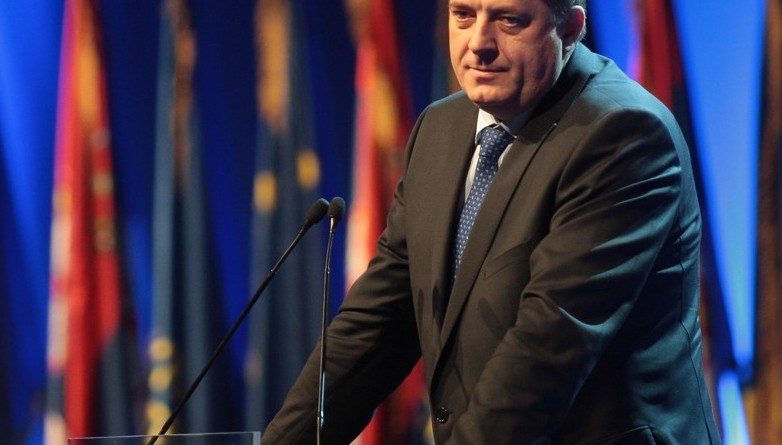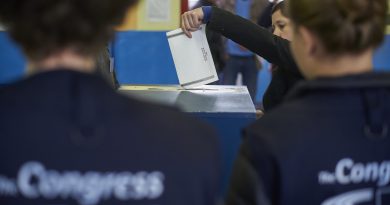Bosnia Risks Implosion Amid Serb President’s Ethnic Rhetoric
Jarrett Dang
Editor-in-Chief
Decades-old tensions are flaring in Bosnia and Herzegovina as the leader of one of the country’s three dominant groups moves toward secession. The Balkan nation is governed by an ethnicity-based system of government featuring three presidents: one Bosniak, one Croat, and one Serb.
According to CNN, Serb President Milorad Dodik is escalating ethno-nationalist rhetoric that threatens the country’s fragile system of government forged by the 1995 Dayton Peace Accord that ended the Bosnian war. Dodik has threatened to pass legislation in the Serb-majority Republika Srpska, one of Bosnia’s two main political entities, to remove the influence of national institutions and create Serb-only replacements.
The steps Dodik is proposing would spark a political crisis in the Balkans and could lead to a renewal in fighting after 30 years of peace. Secessionists led by Dodik claim that Republika Srpska does not have enough autonomy from the central government. While Dodik has mostly stayed the course with his secessionist messaging, the Serb leader has not yet implemented his most radical proposals. These actions, which would push the crisis past a point of no return, including withdrawing the Republika Srpska from Bosnia’s armed forces and creating its own, reports Al Jazeera.
The United States and European Union, the main guarantors of the Dayton agreement, are both trying to stamp out a conflict before one begins. Reuters reports U.S. Secretary of State Antony Blinken sent a letter to the joint Bosnian presidency, threatening to impose sanctions on those making moves to “unilaterally withdraw from state-level institutions or otherwise destabilize” the Dayton agreement. European countries are similarly ramping up the pressure, with German Foreign Minister Heiko Maas announcing that his country would not stand by as Dodik threatens secession, says an additional Reuters report.
While the U.S. and its allies are now scrambling to prevent another Balkan war, some experts say that America and the EU ignored warning signs leading up to the crisis. The EU, despite being the main security entity in Europe, failed to rein in Dodik and took a hands-off approach even as secessionists grew louder, according to Politico. The U.S. previously sanctioned Dodik in 2017 for undermining the Dayton agreement, but a lack of recent pressure may have contributed to the Serb leader’s boldest attempt to exit the agreement since it was signed.
Other foreign influences are also to blame for the resurgence of Serb nationalism in Bosnia. Russia and Serbia are particularly strong allies of the Republika Srpska and have stymied international efforts to stabilize Bosnia. On November 4, Russia and China prevented a UN Security Council resolution renewing an EU-led peacekeeping mission to Bosnia from passing until the final text omitted mention of the Office of the High Representative of Bosnia and Herzegovina, a watchdog and political entity created by the Dayton agreement. According to Radio Free Europe, the High Representative had previously warned that Bosnian Serbs advocating secession posed an “existential threat” to the nation.
Politics in Bosnia and Herzegovina have been fraught since the Dayton accords, but this attempt at secession poses the greatest threat to peace since 1995. The war, which featured acts of genocide and ethnic cleansing, is a fiercely divisive topic that created scars that still linger among Bosniaks, Croats, and Serbs. According to an additional Politico report, the latest crisis was triggered when the High Representative used his executive authority to outlaw genocide denial, a measure aimed at Serb nationalists who have consistently denied the Srebrenica genocide saw Serbian forces murder over 8,000 mostly Bosniak people.
As the main guarantor of the Dayton Agreement, the U.S. is in a unique position to defuse a potential war before tensions mount. America’s role in Bosnia dates back to the Bosnian war when then-President Bill Clinton authorized a NATO intervention against Serbia-led Yugoslavia. Since then, administrations of both parties have continued U.S. support of the agreement, including President Joe Biden who has sent high-level diplomatic personnel to Bosnia. According to Politico, U.S. special envoy to the Western Balkans Gabriel Escobar held direct talks with Dodik, saying afterward that he “was open to discussing withdrawing all the legislation that would weaken the central institutions.”
Image courtesy of DEMOKRATSKA STRANKA DS (Wikimedia Commons)


